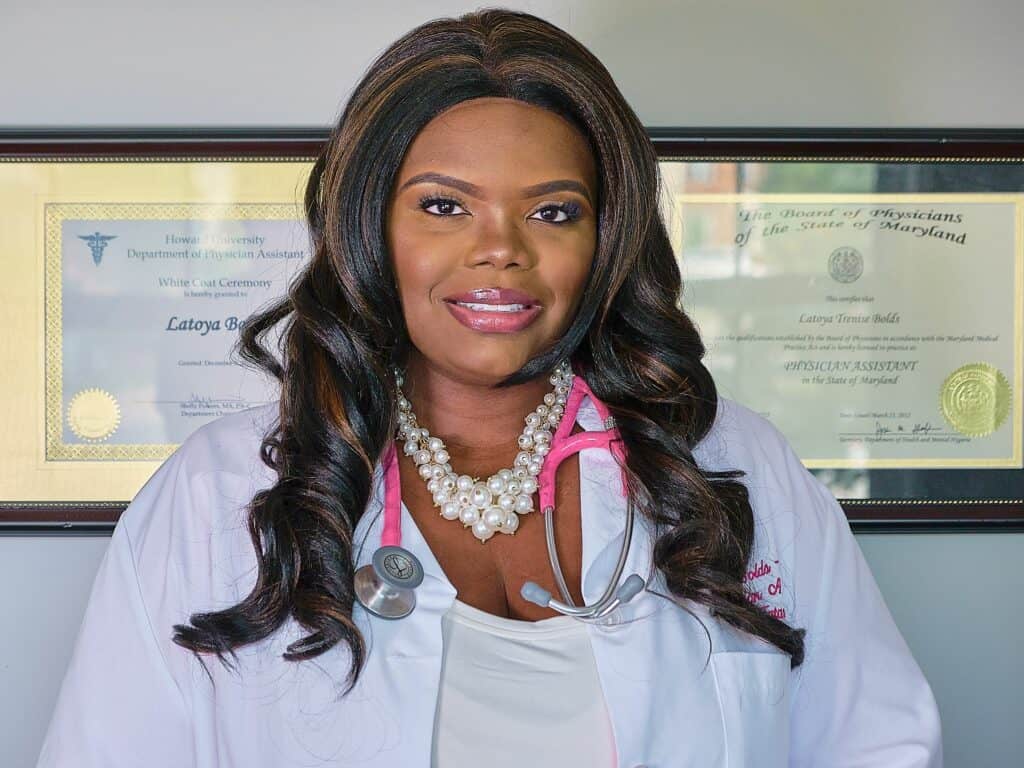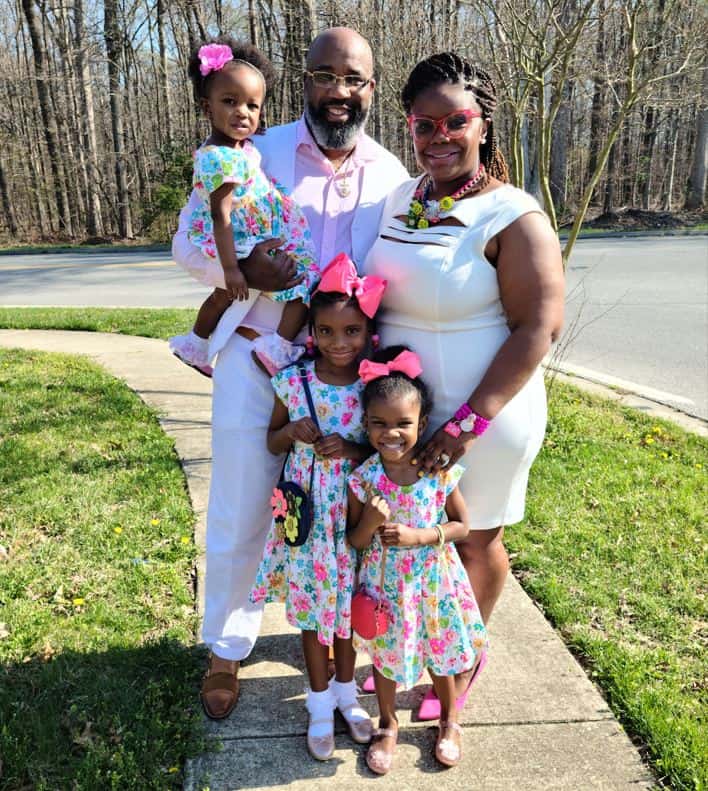
LaToya Bolds-Johnson, a physician assistant, was diagnosed with stage 3C triple negative breast cancer in July 2021, when she was 35. LaToya and her husband are parents to three young daughters. This is her story in her own words.
I don’t have a history of breast cancer in my immediate family. About a month before I was diagnosed, I felt a lump in my left breast. I had stopped breastfeeding my youngest daughter five or six months prior to that, so initially I thought it was a milk cyst. But I continued to feel it, and when I asked my husband to feel it, and he could, too, so I went ahead and scheduled a virtual appointment with my doctor. I really didn’t expect to receive a mammogram order, but the doctor ordered a mammogram and a sonogram (breast ultrasound).
When the radiologist called with the results, he said the margins of the findings looked a little suspicious and I should get a biopsy. My heart dropped when he said that because, at that point, I knew what it meant. I knew there was a potential for cancer. And when the radiologist, during the biopsy, tried to retract and aspirate fluid and couldn’t, I just started bawling, crying on the table, because I knew.
The biopsy was a Friday. That was the longest weekend of my life. The results were breast cancer. I usually work 12-hour days, so when I found out the results, I went home early. And my husband came out of the house and saw me, and he just fell to the ground, because he knows I’m not supposed to be home in the middle of the day. It was horrible.
I didn’t know the stage yet, so my emotions were all over the place. Because I’m in the medical field, a health care professional, all I could think was, oh my God, I hope it hasn’t metastasized (or spread) to my organs. I was just thinking of a death sentence at that point. Triple negative is an aggressive form of breast cancer, and I didn’t know the staging yet and thinking if we had waited for a mammogram until I was 40…I wouldn’t have made it to my 40th birthday.
Another week and a half passed before I learned it was stage 3C. At that point, it hit me – I’m actually a patient. It’s a struggle from going to caring for patients to being on the other side. It’s the most vulnerable position I’ve ever been in, in my life. I’ve known since I was 4 years old that I wanted to be in the medical field, and now to be a patient, to have other people wait on you and take care of you, it was just really hard to process.
I worked until two days before I started chemo. I had my port placed and worked two more days. I was just still in disbelief. How could I be sick?

I’ve had chemotherapy and surgery. I had a bilateral mastectomy and 26 lymph nodes removed. Then I did 25 rounds of radiation. I’ve been accepted into a clinical trial. I had a good response to the chemo, but my tumor did not shrink all the way. Because I still have residual triple-negative breast cancer, my standard of care is to have another six to eight cycles of oral chemo and immunotherapy.
Once my treatment ends, I can get to breast reconstruction. And I’m dealing with severe body dysmorphia with my breast being gone. Because I had to have radiation, it was not recommended I have expanders, so I’m completely flat.
I would tell someone to be kind to yourself and realize that God is sending you through this for a particular reason. This is part of your journey, and this is how you’re going to be able to help other people.
What has helped me is helping others. I’m a nurturer and someone who cares about other people naturally. I can’t be with patients right now, but I can share my story, and I might be able to help someone out there.
It’s important to do your breast exams, advocate for yourself, know your family health history and not wait until you’re 40 for a mammogram if you’re high risk. African American women – we’re dying at a more than 40% higher rate than any other group of women, so I think we should be screened before the age of 40. Things need to happen earlier.
For more information about Black breast health equity through our Stand for H.E.R. program, please visit our komen.org/standforher page.
Statements and opinions expressed are that of the individual and do not express the views or opinions of Susan G. Komen. This information is being provided for educational purposes only and is not to be construed as medical advice. Persons with breast cancer should consult their healthcare provider with specific questions or concerns about their treatment.



